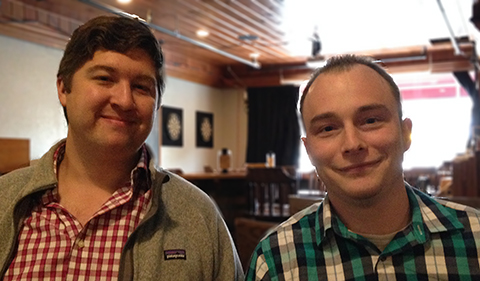
From left, Chris Talbot and Michael Richard
by Aissatou Boye ’20
Michael Richard ’12 ’13M and Chris Talbot visited Dr. Nicole Kaufman’s criminology class in October. Both are senior associates with Discover Financial Services in Columbus.
Richard is an Ohio University alum who double majored in Sociology and Mathematics and also earned an M.A. in Sociology from the College of Arts & Sciences. Talbot is Miami University alum who studied History and Political Science, then earned his MBA and law degrees from the University of Dayton.
“I currently work in the field of compliance with a focus on Anti Money Laundering (AML) and Know Your Customer (KYC) where I have been the Subject Matter Expert on my investigative team as well as severed in quality control and management roles,” Richard says on his LinkedIn profile.
Richard and Talbot came to speak about their profession in the field of money laundering. Richard explained that he became interested in the field because he “liked the combined skill set that this line of work encompassed.” Through his description of working in this field, it was obvious that through the varying situations money laundering deals with, they have the ability to perform a wide array of tasks.
They defined money laundering as the process of “making dirty money look legal.”
The class learned the three stages of money laundering: placement, layering, and integration. They then explained how to detect money laundering and what may be classified as suspicious. Richard and Talbot also spoke about what areas and people are mostly affected by this crime. The speakers referenced the recent investigation of former Trump campaign adviser Paul Manafort, elucidating the significance of the incident and how it relates to their line of work.
When Richard and Talbot first started working in this field, they started as “anti-money laundering associates.” This position is usually filled by college graduates who can think critically and write well. Talbot said this job “is a good way to transition into law enforcement” and encourages students to get involved in this area of work if interested.
A member of the class, Logan Swafford ’20 (Psychology and Sociology-Criminology), commented that she “thought it was super interesting because I knew it was a profession people went into, but I didn’t know it was a field that was accessible to people in our majors. The guys that came in were able to provide a lot of information but still able to keep us all interested at the same time.”



















Comments